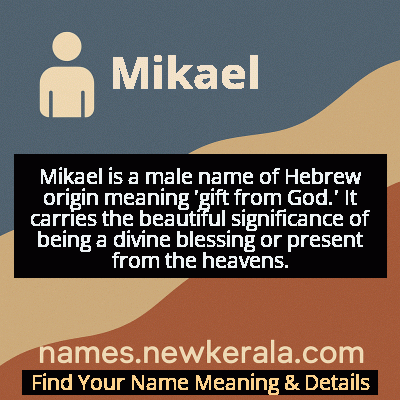Mikael Name Meaning & Details
Origin, Popularity, Numerology Analysis & Name Meaning of Mikael
Discover the origin, meaning, and cultural significance of the name MIKAEL. Delve into its historical roots and explore the lasting impact it has had on communities and traditions.
Name
Mikael
Gender
Male
Origin
Hebrew
Lucky Number
6
Meaning of the Name - Mikael
Mikael is a male name of Hebrew origin meaning 'gift from God.' It carries the beautiful significance of being a divine blessing or present from the heavens.
Mikael - Complete Numerology Analysis
Your Numerology Number
Based on Pythagorean Numerology System
Ruling Planet
Venus
Positive Nature
Harmonious, responsible, caring, and artistic.
Negative Traits
Overly idealistic, superficial, possessive, or jealous.
Lucky Colours
Pink, turquoise.
Lucky Days
Friday.
Lucky Stones
Diamond, turquoise.
Harmony Numbers
2, 3, 9.
Best Suited Professions
Artists, musicians, teachers, healthcare workers.
What People Like About You
Warmth, nurturing nature, artistic flair.
Famous People Named Mikael
Mikael Agricola
Religious Reformer and Linguist
Father of written Finnish, translated the New Testament into Finnish
Mikael Lustig
Professional Footballer
Swedish national team defender, multiple Scottish Premier League titles with Celtic FC
Mikael Stanne
Musician
Lead vocalist of Swedish melodic death metal band Dark Tranquillity
Mikael Silvestre
Professional Footballer
French international defender, won multiple Premier League titles with Manchester United
Name Variations & International Equivalents
Click on blue names to explore their detailed meanings. Gray names with will be available soon.
Cultural & Historical Significance
In Nordic cultures, Mikael has maintained strong popularity and cultural relevance. The name is celebrated on name days in both Sweden and Finland on September 29th, coinciding with the Feast of Saint Michael. Throughout Scandinavian history, the name has been borne by kings, saints, and influential figures, cementing its status as a classic, respected name. The cultural significance extends beyond religious contexts to represent strength, protection, and leadership qualities that are highly valued in Nordic societies. The name's enduring appeal reflects its deep roots in both religious tradition and cultural identity.
Extended Personality Analysis
Individuals named Mikael are often characterized by their strong sense of justice and natural leadership abilities. They tend to be protective, reliable, and principled, with an innate desire to stand up for what they believe is right. Many Mikaels exhibit a calm, determined demeanor that inspires confidence in others, making them natural problem-solvers and mediators in difficult situations. Their association with the archangel Michael often leads to expectations of moral strength and the courage to confront challenges head-on.
In social contexts, Mikaels are typically perceived as loyal friends and dependable partners who value deep, meaningful relationships. They often possess a strategic mind and practical intelligence that serves them well in professional settings. While they can be reserved initially, once trust is established, they reveal a warm, protective nature. Some may struggle with perfectionism or being overly critical, but this stems from their high standards and commitment to excellence. The combination of strength and sensitivity makes Mikaels well-rounded individuals who can navigate both personal and professional challenges with grace and determination.
Modern Usage & Popularity
In contemporary times, Mikael remains particularly strong in Scandinavian countries where it continues to be a popular choice for newborn boys. In Sweden, it has maintained consistent popularity since the 1970s, often ranking within the top 50 male names. The name has also gained international recognition through Nordic cultural exports, including famous athletes like footballer Mikael Lustig and musicians like Mikael Stanne of Dark Tranquillity. While the English variation Michael remains more common in English-speaking countries, Mikael has seen increased usage as parents seek names with international flair and traditional roots. The name's appeal lies in its combination of strong historical significance, pleasant phonetic qualities, and cross-cultural accessibility, making it a timeless choice that bridges traditional values with modern sensibilities.
Symbolic & Spiritual Meanings
Mikael carries rich symbolic meanings rooted in its religious origins and cultural associations. Primarily, it represents divine protection and the triumph of light over darkness, drawing from the archangel Michael's role as a heavenly warrior who defeats evil forces. The name symbolizes moral courage, justice, and the strength to stand up for righteous causes. It also embodies the concept of spiritual leadership and the responsibility that comes with power. In a broader metaphorical sense, Mikael represents the human capacity for resilience in facing adversity and the importance of maintaining integrity under pressure. The name suggests a bridge between the earthly and divine, symbolizing how ordinary individuals can embody extraordinary principles of protection, justice, and moral fortitude in their daily lives.

